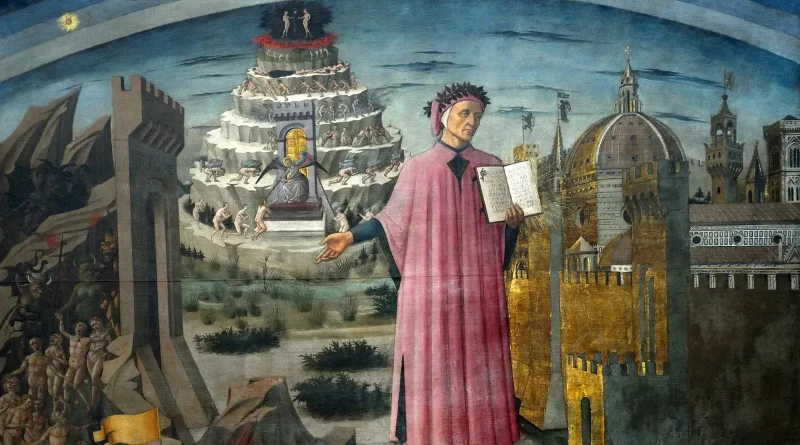A Journey Through the Divine Comedy: Exploring Dante Alighieri’s Masterpiece
Introduction
Dante Alighieri’s Divine Comedy stands as one of the most enduring and influential works in world literature. Written in the early 14th century, this epic poem takes readers on a profound journey through the realms of the afterlife, exploring themes of sin, redemption, and the nature of divinity.
A Journey Through Divine Comedy
Dante Alighieri’s Divine Comedy stands as a testament to the enduring power of literature to illuminate the human experience. Through its three distinct realms of Hell, Purgatory, and Heaven, Dante takes readers on a profound exploration of sin, redemption, and the divine. Each part of the epic poem offers a rich tapestry of allegorical encounters, revealing not only the consequences of human actions but also the possibility of spiritual transformation.
Reverberations in the Present
As readers traverse the circles of Hell with Dante, they encounter vivid depictions of punishment and suffering, each carefully crafted to reflect the gravity of sin. Yet, amidst the darkness, there is a glimmer of hope, as Dante learns the importance of repentance and the possibility of salvation. Through Divine Comedy, Dante’s timeless message resonates across the centuries, reminding us of the enduring power of faith, forgiveness, and the pursuit of higher truths.
The Life of Dante Alighieri
Before delving into the intricacies of Divine Comedy, it’s essential to understand the life of its author, Dante Alighieri. Born in Florence, Italy, in 1265, Dante was a prominent poet, philosopher, and politician of the Late Middle Ages. His experiences, including exile from Florence, greatly influenced his literary works.
Overview of Divine Comedy
Divine consists of three parts: Inferno, Purgatorio, and Paradiso. Each section follows Dante’s journey through different realms of the afterlife guided by the Roman poet Virgil and his beloved Beatrice.
The Journey through Hell
In the first part, Dante explores the nine circles of Hell, each reserved for specific sins. From Limbo to the deepest pits of punishment, Dante encounters historical figures, mythological creatures, and allegorical representations of sinners.
The Journey through Purgatory
In Purgatorio, Dante ascends the mountain of Purgatory, where souls undergo purification before entering Heaven. Here, he encounters penitent souls striving for redemption and learns the importance of repentance and forgiveness.
The Journey through Heaven
The final part of Paradiso, depicts Dante’s ascent through the celestial spheres, guided by Beatrice. He experiences the beauty of Heaven, culminating in the Beatific Vision, where he beholds the divine essence.
Literary Significance of Divine Comedy
Influence extends far beyond its medieval origins. It has inspired countless writers, artists, and thinkers throughout history. Its rich symbolism and philosophical depth continue to captivate readers and scholars alike.
Divine Comedy in Popular Culture
From literature to film, music to visual arts, references to Divine Comedy abound in popular culture. Modern adaptations and interpretations ensure that Dante’s masterpiece remains relevant in today’s world.
Conclusion
Dante Alighieri’s Divine Comedy remains a timeless masterpiece that transcends the boundaries of time and culture. Its exploration of the human condition and the divine realm continues to fascinate and inspire readers worldwide.
FAQs
Is Divine Comedy based on Dante’s personal experiences?
While is influenced by Dante’s life, it is primarily an allegorical journey through the afterlife.
What is the significance of Beatrice in Divine Comedy?
Beatrice serves as Dante’s guide to Paradise, symbolizing divine grace and salvation.
How did Divine Comedy impact Italian literature?
Played a crucial role in shaping the Italian language and establishing Tuscan dialect as a literary standard.
Are there any modern adaptations of Divine Comedy?
Yes, various novels, films, and artworks draw inspiration from Dante’s epic poem, offering contemporary interpretations of its themes.
What lessons can readers glean from Divine Comedy?
Teaches valuable lessons about morality, redemption, and the human quest for spiritual enlightenment.



